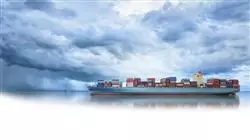University certificate
The world's largest school of business”
Why study at TECH?
With this Postgraduate diploma you will contribute to the different port strategies providing evolution in the logistics function of the Supply Chain"

Why Study at TECH?
TECH is the world's largest 100% online business school. It is an elite business school, with a model based on the highest academic standards. A world-class center for intensive managerial skills education.
TECH is a university at the forefront of technology, and puts all its resources at the student's disposal to help them achieve entrepreneurial success”
At TECH Global University
|
|
Innovation |
The university offers an online learning model that balances the latest educational technology with the most rigorous teaching methods. A unique method with the highest international recognition that will provide students with the keys to develop in a rapidly-evolving world, where innovation must be every entrepreneur’s focus.
"Microsoft Europe Success Story", for integrating the innovative, interactive multi-video system.
|
|
The Highest Standards |
Admissions criteria at TECH are not economic. Students don't need to make a large investment to study at this university. However, in order to obtain a qualification from TECH, the student's intelligence and ability will be tested to their limits. The institution's academic standards are exceptionally high...
95% of TECH students successfully complete their studies.
|
|
Networking |
Professionals from countries all over the world attend TECH, allowing students to establish a large network of contacts that may prove useful to them in the future.
100,000+ executives prepared each year, 200+ different nationalities.
|
|
Empowerment |
Students will grow hand in hand with the best companies and highly regarded and influential professionals. TECH has developed strategic partnerships and a valuable network of contacts with major economic players in 7 continents.
500+ collaborative agreements with leading companies.
|
|
Talent |
This program is a unique initiative to allow students to showcase their talent in the business world. An opportunity that will allow them to voice their concerns and share their business vision.
After completing this program, TECH helps students show the world their talent.
|
|
Multicultural Context |
While studying at TECH, students will enjoy a unique experience. Study in a multicultural context. In a program with a global vision, through which students can learn about the operating methods in different parts of the world, and gather the latest information that best adapts to their business idea.
TECH students represent more than 200 different nationalities.

|
|
Learn with the best |
In the classroom, TECH’s teaching staff discuss how they have achieved success in their companies, working in a real, lively, and dynamic context. Teachers who are fully committed to offering a quality specialization that will allow students to advance in their career and stand out in the business world.
Teachers representing 20 different nationalities.
TECH strives for excellence and, to this end, boasts a series of characteristics that make this university unique:
|
|
Analysis |
TECH explores the student’s critical side, their ability to question things, their problem-solving skills, as well as their interpersonal skills.
|
|
Academic Excellence |
TECH offers students the best online learning methodology. The university combines the Relearning methodology (the most internationally recognized postgraduate learning methodology) with Harvard Business School case studies. A complex balance of traditional and state-of-the-art methods, within the most demanding academic framework.
|
|
Economy of Scale |
TECH is the world’s largest online university. It currently boasts a portfolio of more than 10,000 university postgraduate programs. And in today's new economy, volume + technology = a ground-breaking price. This way, TECH ensures that studying is not as expensive for students as it would be at another university.
At TECH, you will have access to the most rigorous and up-to-date case analyses in academia”
Syllabus
The program in Supply Chain and Intermodal Transport is a program that focuses primarily on core competencies related to Logistics Company Operations, International Regulatory Bodies and Global Shipping Requirements. All this, oriented from a theoretical-practical approach in addition to the experience and background of an excellent teaching team in this area of knowledge.
With TECH you will find the updates you need to continue growing in the field of Port Management"
Syllabus
This Postgraduate diploma consists of 450 teaching hours, positioning students at the top of their professional career with respect to the different challenges of Port Management and Intermodal Transport. That is why this program transcends in diverse competences and technical skills to acquire unique knowledge in new technologies applied to logistics, typologies of logistic platforms and the maritime transport market.
In order to achieve these objectives, the teaching team has designed an interesting syllabus with 3 modules for the graduates to investigate and strengthen their skills in e-commerce logistics, international legal framework and CO2 emissions reduction.
In this way, the graduates will acquire solid knowledge in specific aspects of the importance of maritime transport in globalization, the different models of port governance and the general composition of current intermodal chains. It is a program that integrates a highly experienced and fully specialized team, supported with high quality audiovisual content that offers dynamism and comfort with the 100% online mode.
And so, TECH guides its teaching from the comfort and excellence with a program that offers the most complete update and the highest academic standards, being a qualification of great flexibility by only needing an electronic device with Internet connection.
This Postgraduate diploma takes place over 6 months and is divided into 3 modules:
Module 1. Logistics and Logistics Operators
Module 2. Multimodal Transport, Intermodality and Logistics Platforms
Module 3. Maritime Transport

Where, When and How is it Taught?
TECH offers the possibility of developing this Supply Chain and Intermodal Transport Postgraduate diploma in a totally online way. Throughout the 6 months of the program, you will be able to access all its contents of at any time, allowing you to manage your study time.
Module 1. Logistics and Logistics Operators
1.1. Logistics
1.1.1. Logistics, Role in the current economic flow
1.1.2. Logistics and supply chain. Differences
1.1.3. Logistics in the company. Importance
1.2. Logistic areas and typologies
1.2.1. Logistics areas
1.2.2. Internal logistics vs. external logistics
1.2.3. Logistics key elements
1.3. Logistics operations
1.3.1. Operations of logistics companies
1.3.2. The logistics process and its elements
1.3.3. Stages of the logistics chain
1.3.4. Problems that arise in logistics environments
1.4. Logistics adapted to current market needs
1.4.1. Logistics in e-commerce. Distribution Logistics
1.4.2. Reverse Logistics
1.4.3. Logistics Indicators
1.4.4. Current logistics
1.5. New Technologies Applied to Logistics
1.5.1. Robotics and automated warehouses
1.5.2. Process Automation
1.5.3. Information systems applied to logistics
1.5.4. Blockchain and Machine Learning
1.6. Logistics of the future
1.6.1. Challenges facing logistics
1.6.2. Green Logistics
1.6.3. New trends in logistics
1.7. Logistics Operators
1.7.1. Global Logistics
1.7.2. Figure of the logistics operator
1.7.3. Evolution of logistics operators up to the present day
1.7.4. The Logistics Operator. Requirements
1.8. Logistics Operators and the Outsourcing Contract
1.8.1. The Outsourcing Contract. Clauses, SLA's
1.8.2. Services provided by logistics operators
1.8.3. Advantages offered by logistics operators
1.9. Logistics Operators Functions and typology
1.9.1. Functions of logistics operators
1.9.2. Party Logistics (PL). Uses
1.9.3. Types of logistics operators. Services and infrastructures
1.9.4. The future of PL From 6 PL to 10PL
1.10. Freight forwarder Vs Logistics operator
1.10.1. Freight Forwarder vs Logistics Operator. Differences and similarities
1.10.2. Evolution of the Freight Forwarder towards the figure Logistics Operator
1.10.3. The freight forwarder and the LSP system Bringing services together
Module 2. Multimodal Transport, Intermodality and Logistics Platforms
2.1. The Warehouse
2.1.1. Phases of the logistics activity. Role of the warehouse in the supply chain
2.1.2. Warehouse activities
2.1.3. Types of warehouses
2.1.4. Storage alternatives
2.2. Logistics platforms
2.2.1. Warehouse Vs Logistics platform Differentiating Elements
2.2.2. Types of logistics platforms
2.2.3. Operation of a logistics platform. Infrastructures, space organization and human and mechanical resources
2.3. Logistics platforms as an integrating element of the intermodal chain
2.3.1. Types of logistics platforms
2.3.2. Location as a differentiating element of logistics platforms HUB warehouses
2.3.3. Micro logistics platforms Urban SLPs
2.4. Land transport of goods by road
2.4.1. International land transport of goods. Primary infrastructures and international legal framework
2.4.2. Types of freight transport by road
2.4.3. Key elements for the management of road transport companies
2.4.4. Digital transformation of road transport companies. Management Systems
2.5. Rail freight transport
2.5.1. Rail transport. Situation of international rail freight networks
2.5.2. Railway operators
2.5.3. Types of rail transport
2.6. Maritime transport of goods
2.6.1. International regulatory bodies
2.6.2. Relevant legislation
2.6.3. Long distance maritime transportation
2.6.4. Short sea shipping and highways of the sea
2.6.5. Transport of goods by inland waterways
2.6.6. Maritime Transport Key Aspects
2.7. Air transport of goods
2.7.1. International regulatory bodies
2.7.2. International legal framework
2.7.3. Essential infrastructures
2.7.4. Aircraft. Typology
2.7.5. Air transport Key Aspects
2.8. Capillary distribution of goods
2.8.1. Capillary distribution, the last link in the logistics chain
2.8.2. Capillary distribution operation
2.8.3. Last mile logistics. Functioning
2.9. Multimodal and combined transport
2.9.1. Multimodal and combined transport
2.9.2. Multimodality Vs Intermodality
2.9.3. Role of Multimodal Transport Operators (MTOs)
2.10. Intermodal transport
2.10.1. Intermodal transport
2.10.2. Types of intermodality
2.10.3. Role of the warehouse in intermodality Cross-docking
2.10.4. The intermodal transport operator
2.10.5. Intermodal transport systems
2.10.6. Intermodal transport. Advantages, Problems and Challenges
Module 3. Maritime Transport
3.1. Maritime Transport and International Trade
3.1.1. Maritime Transport
3.1.2. International Trade
3.1.3. Maritime traffic
3.1.4. TRAMP traffic and regular lines
3.2. Types of Vessels in Maritime Transport
3.2.2. Types of Vessels in Maritime Transport according to their cargo
3.2.2. Evolution of the maritime transport ships
3.2.3. The Container
3.2.3.1. Types of maritime containers
3.3. Maritime Transportation Market
3.3.1. Maritime Transportation Market
3.3.2. World fleet
3.3.3. World Shipping Requirement
3.4. Maritime Transportation Costs
3.4.1. Cost distribution
3.4.2. Fixed Costs
3.4.3. Variable Costs
3.4.4. Loading/unloading costs
3.4.5. Factors influencing cost
3.5. Maritime Traffic
3.5.1. Oil traffic
3.5.2. Bulk solids traffic
3.5.3. General cargo
3.6. Maritime Law
3.6.1. Maritime privileges
3.6.2. Ship mortgage
3.6.3. International Maritime Transport Regulations and Conventions
3.7. Contracts for the Operation of the Vessel
3.7.1. Economic operation of the vessel
3.7.2. Bareboat Lease
3.7.3. Chartering
3.7.4. Passenger contract
3.8. Freight Market
3.8.1. Freight Market Evolution
3.8.2. Periods
3.8.3. Supply/Demand
3.9. Marine Accident and Marine Insurance
3.9.1. Accidents in navigation
3.9.2. Types of damage
3.9.3. Marine insurance
3.10. Emissions. International regulation
3.10.1. Emissions from maritime transport
3.10.2. International regulation
3.10.3. Forms of compliance with regulations
3.10.4. Reduction of CO2 emissions

The teaching materials of this program, elaborated by these specialists, have contents that are completely applicable to your professional experiences”
Postgraduate Diploma in Supply Chain and Intermodal Transportation
In the dynamic modern business scenario, efficient supply chain and intermodal transportation management has become critical to organizational success. TECH Global University presents a comprehensive Postgraduate Diploma, a program designed to catapult your career in logistics and offer innovative solutions to contemporary challenges in this area. The Postgraduate Certificate is delivered online, allowing you to access high quality content from anywhere. This flexibility is key for busy professionals who want to advance their careers without compromising their job responsibilities. Here, we focus on providing you with the practical skills needed to optimize processes, reduce costs and improve efficiency in any organization's supply chain. One of the greatest benefits of this program is its high-level theoretical-practical approach.
The program is designed to provide you with the practical skills you need to optimize processes, reduce costs and improve efficiencies in any organization.
Degree with a Postgraduate Diploma in Supply Chain and Intermodal Transportation
By choosing our program, you will be immersed in a specialized curriculum that covers the most relevant aspects of this field. We will address real-world case studies, placing you in simulated business scenarios that reflect the challenges you will face in your professional career. In addition, you will have the opportunity to interact with industry experts and leading professionals who will share their knowledge and experiences. The online modality not only provides you with flexibility, but also fosters collaboration and constant interaction with your classmates and professors through advanced digital platforms. This enriching online community will allow you to build a global network of contacts, an invaluable advantage in today's business world. Get ready to transform your career with TECH Global University's Postgraduate Diploma in Supply Chain and Intermodal Transportation. Gain the skills you need to stand out in an increasingly competitive and dynamic job market.

















